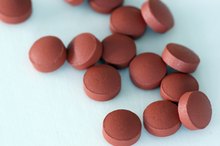Arginine & Lysine
Lysine and arginine are two amino acids found in protein-rich foods. Lysine is an essential amino acid, meaning your body can't make it from other amino acids. Arginine is a semi-essential amino acid; although your body can make it, people with certain health conditions may need a supplement. Because supplemental lysine and arginine may cause side effects and pose safety risks, discuss use with a doctor.
Use
Lysine is used for fat digestion, lowering cholesterol, forming collagen and absorbing calcium. Some people take supplemental lysine to help prevent or treat cold sores and herpes infections. Your body uses arginine to create urea and creatine, which support kidney function. Supplemental arginine may help to prevent or treat congestive heart failure, bladder inflammation and wasting with HIV/AIDS.
Interaction
Lysine Overdose Symptoms
Learn More
Arginine and lysine use the same pathway for absorption, so if you consume high amounts of arginine you may have difficulty absorbing sufficient lysine, according to the University of Maryland Medical Center. If you are trying to increase lysine levels in your body, do not take arginine supplements and consider consuming fewer foods containing arginine, which include meats, dairy products, chocolate, raisins, nuts, seeds, brown rice, oats and cereals.
Side Effects
Supplemental lysine can cause side effects including nausea, diarrhea, abdominal pain, gallstones and elevated cholesterol, especially when taken at higher doses. Arginine can cause side effects including bloating, abdominal pain, gout, diarrhea, bitter taste, allergies, nausea, numbness, headache, lower back pain, low blood pressure, worsening of allergies and blood abnormalities.
Safety
Side Effects of Zymex
Learn More
You should not take arginine or lysine supplements without first consulting your doctor as to whether they are safe for you and what dosage you should use. People with kidney or liver problems and pregnant or nursing women should not take lysine. If you have allergies, low blood pressure, sickle cell disease, liver disease, herpes or have had a recent heart attack, do not take arginine. Stop using arginine at least two weeks before you have surgery. Do not take arginine if you take diabetes medications or blood thinners.
Related Articles
References
Writer Bio
Based in Massachusetts, Jessica Bruso has been writing since 2008. She holds a master of science degree in food policy and applied nutrition and a bachelor of arts degree in international relations, both from Tufts University.









